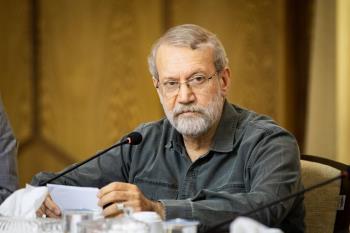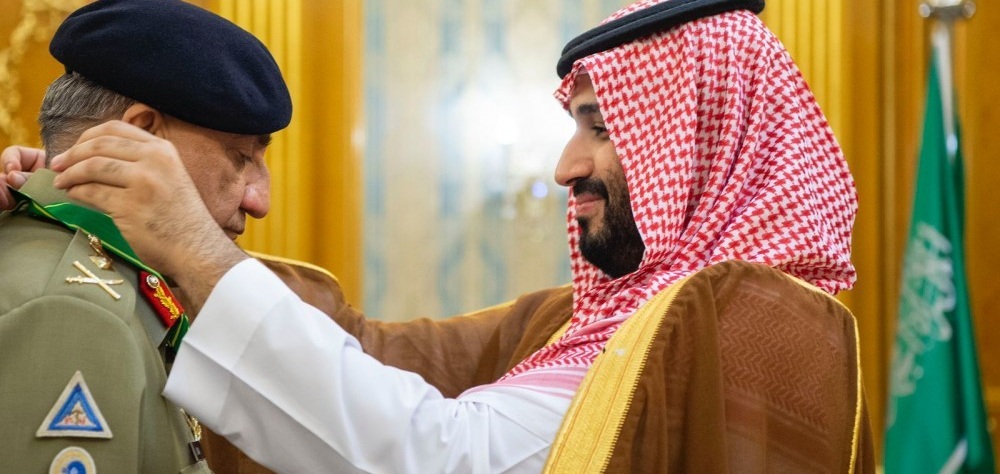Alwaght- In a surprise visit to Saudi Arabia on Sunday, Pakistan's Chief of Army Staff General Qamar Jawed Bajwa met with the Saudi Crown Prince Mohammed bin Salman in Jeddah. They discussed bilateral ties and expanding their partnership in various areas including military and defense.
General Bajwa was awarded Saudi medal of honor.
"Saudi Crown Prince Mohammed bin Salman, implementing King Salman's order, decorated Gen. Qamar Javed Bajwa [with] the King Abdulaziz Medal of Excellent Class, in appreciation of Gen. Bajwa’s distinguished efforts in strengthening and developing Saudi-Pakistani relations," Saudi news agency reported.
The visit in the present conditions carried important messages to bilateral ties and the region. With Pakistan always facing great challenges economically, the Pakistani army chief's visit to the oil-wealthy kingdom is an attempt to gain the trust of the Saudi side to provide financial support to the country to overcome the economic crisis. During Pakistani Prime Minister Shahbaz Sharif's visit to Saudi Arabia two weeks after the new government took office, the Saudis agreed to provide $8 billion in investment to Pakistan's economic infrastructure. Although many of these economic promises have not been fulfilled in the past, the Pakistani military which has the last word even in politics hopes to win the favor of Saudi Arabia.
For Pakistan, in bilateral relations economic interests have the top priority, but for the Saudis such visits are of multifaceted significance. In its approach to Pakistan, Islamabad adopts a policy of friendly relationship with the military for interests. Riyadh leaders are well aware that it is the military that has the last word in the foreign policy and even the fate of government in the country. In other words, it is the military that decides if a government should stay or go. This has been obvious in the past two decades. The latest case is ouster of PM Imran Khan by the secret hands of the military on April 9. Thus, to sway Pakistan's policies, the Saudis are trying to strengthen their alliance with military officials to resort to military to bring allied governments to rule when Pakistan officials decide to go an independent way.
Only two months after the new Pakistani government took office and while the Saudis have warm relationship with the new PM, experience has shown that the foundations of government in Pakistan are always shaky. Given the possibility of Imran Khan's new victory in next elections, the Saudis are mobilizing their forces to set their policies with the military. If Imran Khan assumes the power again, he would likely cut the military generals' power in the politics and this is what the Saudis do not want to see. The Saudis, who have worked closely with the Pakistani military in their regional policies over the past two decades, are still trying to keep it on their side for balance in rivalry with such powers as Iran. The Pakistani military is important to the Saudis because of its nuclear power, and it can provide valuable services to Saudi Arabia as the Saudis are seeking nuclear technology from abroad or even a nuclear bomb off the shelf.
Moreover, Pakistan has improved its ties with Turkey in recent months and invited Ankara to invest in its economy. This is not favorable to the Saudis. Two months ago, Turkey delivered to Pakistan's navy the third corvette. Then Pakistani PM visited Turkey and talked with Ankara leaders expansion of ties in various areas.
The Saudis have always tried to influence Pakistani officials with economic promises and investment in various sectors of Pakistan, and if Turkey penetrates Pakistan's economic layers using its investments, Saudi Arabia would lose the power to influence Islamabad political developments. Therefore, Riyadh promises economic aids to Islamabad to keep it within its circle and influence it politically and economically when the need arises.
Another point about Bajwa’s visit is the loudly-promoted formation of a regional coalition. Given the expected announcement of a new regional coalition during President Joe Biden's visit to Saudi Arabia and Israel, the Saudis are trying to persuade as many countries as possible to join this Arab-Israeli bloc. Pakistan is one of the influential parties in the security developments in the region, on which the Saudis specially count. Pakistan's presence in the security alliance raises the bloc's military weight and brings a great success for the Saudis. Members of the expected coalition are the Persian Gulf Arab states plus Egypt and Jordan, and Pakistan's membership can stretch the new bloc to the eastern Iranian borders, something helping tighten Iranian encirclement, as the founders think.
Yet another case driving the visit is Afghanistan. With Pakistani military playing a big role in shaping Taliban policies, the Saudis hope to play a more influential role in Taliban-ruled Afghanistan. If the Taliban government is recognized by the international community, Saudi Arabia will also advance plans to infiltrate Afghanistan's political body as it is already seeking to lay the foundation for such infiltration through the Pakistani military.
As a conclusion, for the Saudis, Pakistan military is a Trojan Horse to implement its plans in Pakistan effectively and side with Riyadh in its escalatory regional policies.



























